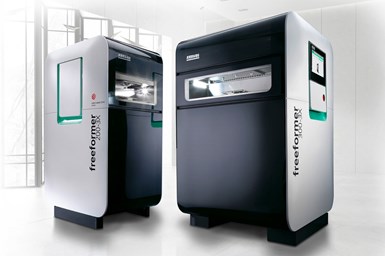Würth Additive Group to Sell Arburg’s Freeformer Systems in U.S., Canada
Freeformer is an open system with an extensive materials database that enables customers to utilize their current production materials to create prototypes or move straight to small series production with additive manufacturing.

As a new partner of Arburg Inc., the Würth Additive Group distributes the Freeformer in the U.S. and Canada.
Würth Additive Group has signed a contract with the U.S. subsidiary of Arburg Inc. to sell its Freeformer additive manufacturing (AM) systems in the U.S. and Canada. The agreement extends the reach of the Arburg Plastic Freeforming (APF) into this region’s general manufacturing market as well as to the oil and gas, heavy equipment and transportation industries.
“The Freeformer and APF process allow us to open up completely new possibilities in the field of industrial additive manufacturing,” says AJ Strandquist, chief executive officer for Würth Additive Group. “Our customers will benefit from the adaptability of the Freeformer, as it is an open system and allows for maximum customization through an extensive materials database. Furthermore, APF process fills the gaps we previously had with customers who use material with additives.”
The company says that APF is an economical process which reduces parts costs. The APF process works on the basis of plastic granules. The open system and the extensive materials database enable customers to utilize their current production materials to create prototypes or move straight to small series production with AM. The Freeformer 200-3X and 300-3X can be used to additively manufacture thermoplastic components from one or multimaterials. Due to the processing of conventional plastic granules as stock material, part costs are a fraction of what is typical in the AM industry.
“We are excited to continue to grow our strategic AM supplier portfolio by partnering with Arburg,” says Dan Hill, chief executive officer for Würth Industry North America. “The formation of our new company, Würth Additive Group, was critical as we continue to deliver and expand on enabling, implementing and supporting digital supply chain solutions that are dependable and beneficial for our customers to operate and ultimately supply them with process and cost efficiencies.”
Related Content
-
What Is Neighborhood 91?
With its first building completely occupied, the N91 campus is on its way to becoming an end-to-end ecosystem for production additive manufacturing. Updates from the Pittsburgh initiative.
-
Video: 5" Diameter Navy Artillery Rounds Made Through Robot Directed Energy Deposition (DED) Instead of Forging
Big Metal Additive conceives additive manufacturing production factory making hundreds of Navy projectile housings per day.
-
3D Printed Titanium Replaces Aluminum for Unmanned Aircraft Wing Splice: The Cool Parts Show #72
Rapid Plasma Deposition produces the near-net-shape preform for a newly designed wing splice for remotely piloted aircraft from General Atomics. The Cool Parts Show visits Norsk Titanium, where this part is made.










